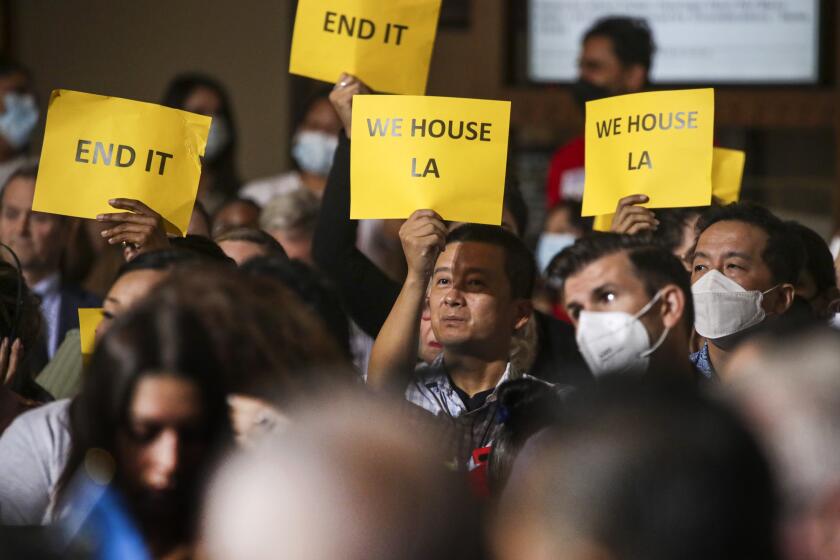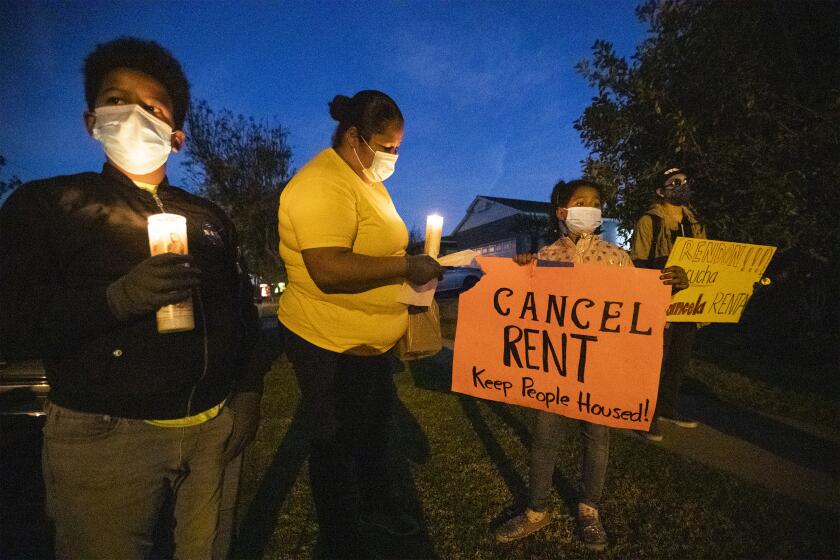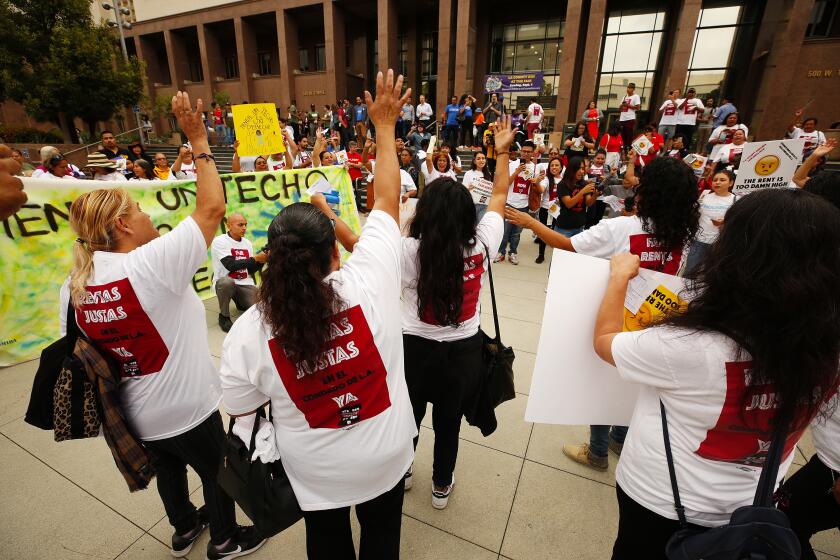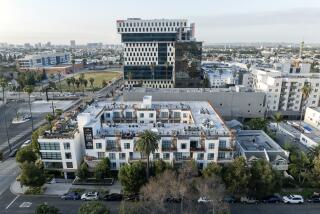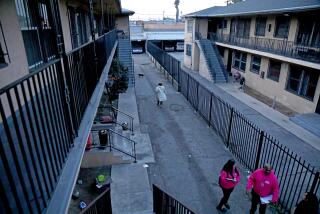L.A. confirms end of COVID eviction rules, while other tenant protections remain in limbo
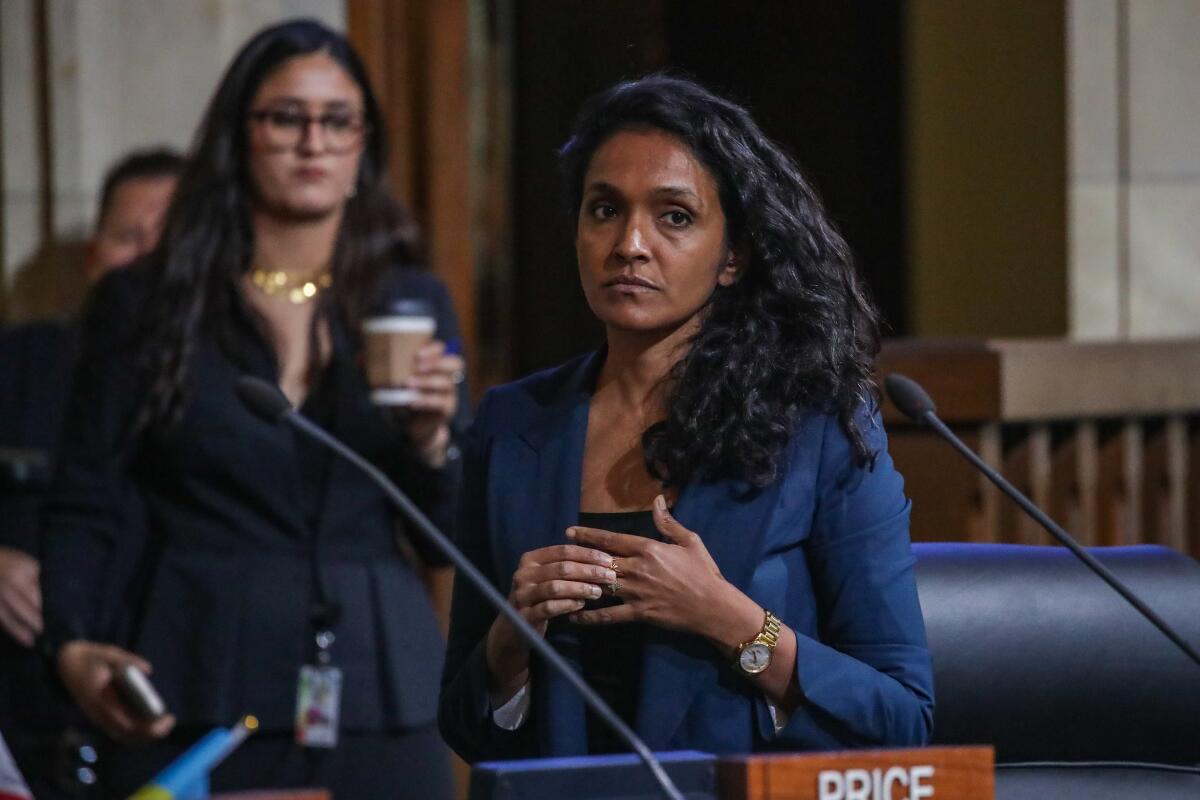
- Share via
Landlords in Los Angeles can resume evicting tenants for unpaid rent and other reasons come Feb. 1, the City Council confirmed in a vote last week.
The decision will end some of the longest-lasting tenant protections in the nation, first passed in March 2020 as part of the emergency response to the COVID-19 pandemic. Since then, landlords have not been allowed to evict their tenants for most reasons, including if the owners wanted to move into their own homes.
The emergency rules have also prohibited landlords from raising the rent in more than 650,000 rent-controlled units in the city, nearly three-quarters of L.A.’s apartment stock. Rent increases in such units will continue to be barred until February 2024.
The city’s emergency protections started amid fears that the deep job loss at the beginning of the pandemic could lead to a tsunami of evictions and worsen the spread of COVID-19. Federal, state and other local political leaders put into place similar anti-eviction rules and offered billions of dollars in financial assistance for those behind on rent.
But as the pandemic wore on, the eviction protections passed elsewhere expired, leaving those in the city among the last of any major metropolitan area. L.A. County’s similar eviction prohibitions will end Dec. 31.
The local tenant protections have persisted as leaders worried that lifting them, especially as waves of coronavirus infection have continued, would exacerbate the region’s underlying homelessness and overcrowding problems.
“We already have 40,000 people living in the street and we don’t want it to be 40,001,” Councilmember Heather Hutt said at a rally for tenant protections this week, referencing the city’s homeless population.
Come Feb. 1, Los Angeles landlords will again be able to evict tenants who are behind on their rent, the City Council decided.
In October, the council first voted to set Feb. 1 as the expiration date for the COVID anti-eviction rules, while also advancing measures that would expand renter protections in general. Most notably, landlords would no longer be allowed to evict tenants in any rental property, including single-family homes, unless there was unpaid rent, documented lease violations, owner move-ins or other specific reasons. Currently, only tenants living in rent-controlled apartments have this protection.
Then-Council President Nury Martinez brokered the deal to move the policies forward together. But less than a week after the October council vote, City Hall was rocked by the leak of an audio tape in which Martinez made a series of racist remarks in a 2021 conversation with Councilmembers Kevin de León and Gil Cedillo and Los Angeles County Federation of Labor President Ron Herrera. Martinez resigned and De León and Cedillo stopped showing up at council meetings amid protests over their behavior.
The chaos made it impossible to garner enough support to advance the original plan all at the same time, said Councilmember Nithya Raman, who now leads the council’s housing committee. Instead, last week’s council vote just set the end of the COVID rules, allowing evictions to resume Feb. 1.
Still, Raman and others believe it remains necessary to pass the further protections before the end of next month. Also under consideration are measures to block evictions until February 2024 for tenants who have unauthorized pets or who added residents who aren’t listed on leases and for tenants who are a month or less behind in rent.
“We made a commitment as a council that we would not move out of this period of emergency protections during COVID without a new set of protections for tenants in place,” Raman said. “It is absolutely essential that we keep that promise to the people of Los Angeles.”
Some of the nation’s strongest protections against eviction and rent increases could end in January after city housing officials recommended their expiration.
The council won’t have much time. Its meeting Tuesday was the last before it recessed for the year. Council meetings resume Jan. 10.
Some of the proposed new protections have more support than others.
John Lee has been among the council members most consistently advocating to end the COVID anti-eviction rules, saying they’re unduly hurting small landlords. Lee said he backs expanding protections against evictions without lease violations, but not the proposal making it harder to evict people for unpaid rent.
“I’m not willing to create any situation where we’re discouraging investment in the city and won’t support anything that will reduce our housing stock,” Lee said.
Despite the rules barring most evictions during the pandemic, the process has been uneven and hard to follow. At various points, tenants have had to pay a portion of rent owed and provide written declarations to their landlord that they’ve been affected by COVID-19. Tenants who remain behind on their rent still owe it.
The level of eviction protection will depend on how long the back rent has been owed and whether tenants followed the notification requirements. In some cases, renters will be permanently barred from eviction for those old debts, though landlords can try to recover the money in small claims court. In other cases, tenants who are now behind will have at least until August before they can be evicted.
The confusion is probably already contributing to a surge in eviction cases even before the protections expire. The number of eviction filings countywide this June eclipsed the amount in February 2020, the last full month before the COVID rules went into place, according to L.A. County Superior Court records compiled by Kyle Nelson, a postdoctoral researcher at UCLA who has tracked them during the pandemic. Since then, filings have continued at pre-pandemic rates.
Some of the proposals would be the first of their kind in Los Angeles County, including allowing tenants to avoid eviction if they fall behind on a month’s worth of rent.
Nevertheless, many landlords have long been eager for the temporary protections to end.
Reid Rose’s mother-in-law died after a long battle with Alzheimer’s disease shortly before the pandemic began. Rents from her Silver Lake duplex had helped pay for her healthcare, and the plan always had been to sell the property and distribute the proceeds to the heirs after her death. But the eviction protections scared away would-be buyers who were uninterested if they couldn’t remove the tenants, Rose said.
Unwilling to sell at well below the property’s value, Rose said his family has been forced to remain landlords. The eviction rules have also prevented them from being able to move in relatives who were looking for housing in Los Angeles.
“We’re just being held in a state of limbo without being able to make any decisions that affect a substantial number of family members,” said Rose, 68. “We do not want to be landlords. The City Council is basically compelling us to be landlords.”
The first day the protections end, Rose said, the family plans to begin evicting their tenants.
More to Read
Sign up for Essential California
The most important California stories and recommendations in your inbox every morning.
You may occasionally receive promotional content from the Los Angeles Times.

